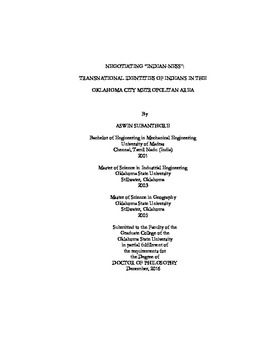| dc.description.abstract | Historically, research on immigrants in the U.S. has relied heavily on interpreting various ways in which they socially and spatially assimilate into urban areas. Since the September 11 attacks, this research has begun to address the shifting negative attention toward immigrants who are Muslim or have Muslim-like appearance. On the one hand, geographers have focused on immigrant transnationalism, signifying inter-connectedness across national borders, and on the other hand, the focus has been on how immigrant identities assimilate within the U.S. society. In this dissertation, I bring these two strands of research together in order to understand the effects of the 9/11 attacks on everyday immigrant life. Specifically, I investigate the case of Indian immigrants in the Oklahoma City metropolitan area (OKC metro) to explore the meanings associated within their transnational identities. I use qualitative research methods, specifically semi-structured interviews and participant observations to analyze data collected in public and private spaces important to Indians in a three-county region that constitute the OKC metro. Results from this analysis show transnationalism, with reference to OKC Indians, is constitutive of everyday practices both within and outside OKC metro. Specifically, three forms of transnational identities among OKC Indians, namely: everyday, racialized, and networked, form as distinct yet mutually constitutive part of the overall immigrant experiences of Indians in the OKC metro. Everyday transnational identities among OKC Indians are socially and spatially constructed in the metro's public places, including Indian grocery stores, Indian restaurants, and religious places including Hindu, Sikh, Christian, and Islamic sites. Since 9/11, these constructions have been further modified as Indians responded to the sometimes negative effects of racialization due to 9/11. Racialized transnational identities have emerged as Indians modify their appearances and find different ways to communicate their identities. Simultaneously, Indians network with other Indians across local, regional, and global scales forming networked transnational identities. In summary, this dissertation aims to enrich the understanding of Indian immigrants in an under-researched geographical area in order to contribute toward positive attention on the everyday life of post-9/11 immigrants in the U.S. | |
